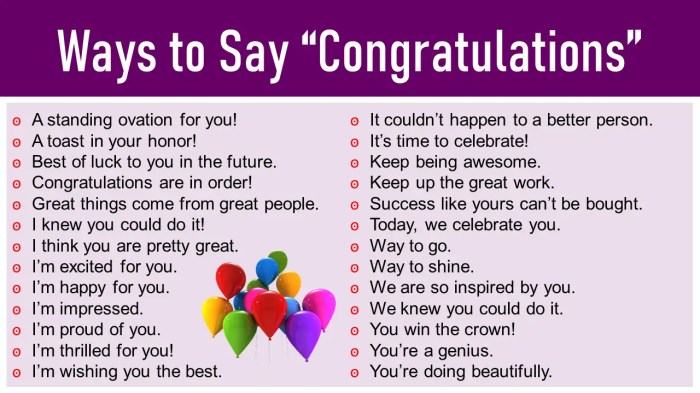How to say congratulations in hawaiian – Exploring the nuances of expressing congratulations in Hawaiian, this article delves into the rich tapestry of the Hawaiian language and its significance in Hawaiian culture. As we embark on this linguistic journey, we will uncover the most formal and informal ways to convey your heartfelt felicitations in this vibrant Polynesian tongue.
How to Say Congratulations in Hawaiian

The Hawaiian language, ʻŌlelo Hawaiʻi, holds immense cultural significance and serves as a vital part of Hawaiian identity. It is spoken by native Hawaiians and is recognized as an official language of the state of Hawaii. This article explores various ways to express “congratulations” in Hawaiian, covering both formal and informal contexts.
Formal Ways to Express Congratulations, How to say congratulations in hawaiian
The most formal way to say “congratulations” in Hawaiian is “E ola mau ka pumehana o kou ola.” Pronounced as “eh oh-lah mow kah poo-meh-hah-nah oh koh oh-lah,” this phrase translates to “May the warmth of your life continue forever.”
This phrase is typically used in highly formal settings, such as official ceremonies or public speeches. It conveys a deep sense of respect and admiration for the recipient’s achievements.
Informal Ways to Express Congratulations
- “Aloha kakahiaka nui!” (pronounced as “ah-loh-hah kah-kah-hee-ah-kah noo-wee”): This phrase translates to “Good morning to you!” and is commonly used to congratulate someone in the morning.
- “E hoʻomaikaʻi!” (pronounced as “eh hoh-oh-mah-ee-kah-ee”): Meaning “Congratulations!”, this phrase is a more direct way to express congratulations in an informal setting.
- “Mahalo nui loa!” (pronounced as “mah-hah-loh noo-wee loh-ah”): Translating to “Thank you very much!”, this phrase can also be used to express congratulations, especially when combined with other words like “E hoʻomaikaʻi!”
Cultural Significance of Congratulations
In Hawaiian culture, expressing congratulations is an important way to acknowledge and celebrate achievements. It reflects the Hawaiian value of hoʻohanohano, which emphasizes respect and honor.
Congratulations are often accompanied by other gestures of support, such as giving gifts or sharing a meal. It is also customary to offer a lei, a traditional Hawaiian garland made of flowers or other natural materials, as a symbol of honor and celebration.
Examples of Congratulations in Context
| Formal | Informal | Context |
|---|---|---|
| E ola mau ka pumehana o kou ola. | E hoʻomaikaʻi! | Congratulating someone on their graduation. |
| Aloha kakahiaka nui! | Mahalo nui loa! | Congratulating someone on their morning run. |
| E hoʻomaikaʻi me ke aloha nui. | Mahalo nui loa a pau! | Congratulating someone on their wedding day. |
Commonly Asked Questions: How To Say Congratulations In Hawaiian
Is it appropriate to use informal ways of expressing congratulations in formal settings?
While informal phrases may be acceptable in casual situations, it is generally advisable to use formal language in more formal settings to show respect and convey the significance of the occasion.
Are there any cultural customs or traditions associated with expressing congratulations in Hawaiian culture?
In Hawaiian culture, expressing congratulations often involves physical gestures such as the “honu” (turtle) hand gesture, which symbolizes good luck and support.

